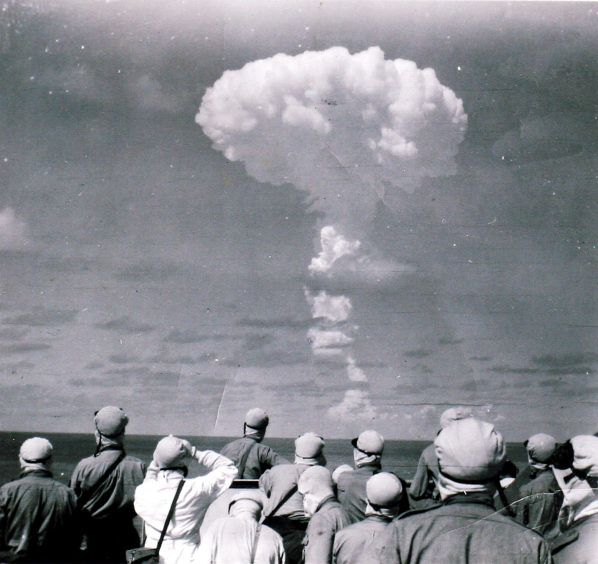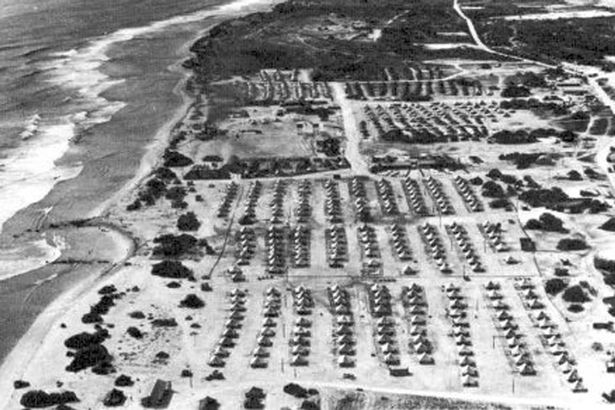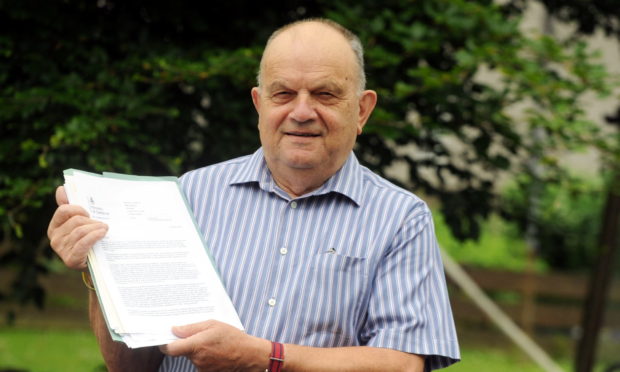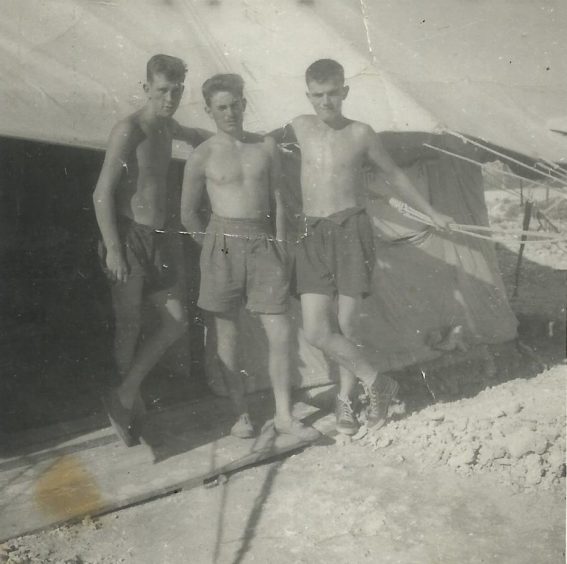Today the power of nuclear and the risks of radiation are well documented and exposure to its dangers avoided at all costs.
But 75 years ago, when hydrogen and atomic bombs were being dropped in the Pacific for the purpose of testing, young soldiers watched with nothing but their own hands for protection.
And for one then 18-year-old Peterhead soldier, seeing the bones shine through his skin and the glow that hung in the Pacific air afterwards was just part and parcel of the job.
It was not until years later that Colin Moir realised the risks he and 3,000 other young troops had faced as nuclear armaments rained down around Kiritimati, also known as Christmas Island.
Today marks the 75th anniversary of Operation Trinity, when the first nuclear device was detonated by the United States Army on July 16, 1945.

And that’s a milestone Colin, a north-east veteran of the UK testing programme, is hoping will aid calls for the government to come clean about what soldiers were subjected to.
“We were two degrees north of the Equator and right slap bang in the middle of nowhere for one year,” Colin, 81, said.
“It was my first posting, having joined the Royal Engineers in May 1957.”
On five different occasions, Mr Moir witnessed the controversial hydrogen bomb tests.
The protection offered to British soldiers on the remote Indian Ocean island between 1957 and 1958 is said to have been almost non-existent.
“The days of the tests you got a bit of a shake and a scare – especially if you were witnessing your your first one,” he said.
“Nobody knew what to expect.
“We had to sit on the ground with our backs to where it was being dropped, and cover our eyes with our hands.
“Then you just counted down and there was a big flash, a blast of heat, then a big blast of wind. A bang. And then everything went flying.
“You could see the shadows of the bones through your hands in the light.
“It was scary, but as we were young soldiers, we didn’t really worry too much. Of course, we should have been worried, but we didn’t know the risks.
“We didn’t know what was going on. Our job was to build the likes of roads and factories for the scientists.”
It wasn’t until he returned home to Hatton that he realised how worried his family had been for him.
“I was never much of a letter-writer but would write home occasionally, saying there’d been explosions, without going into detail,” Mr Moir said.
“But when I did come home, my sister said my mum was scared to even pick up my kit bag, as by then there had been something in the press about the testing.”
After his year on Christmas Island, Mr Moir spent eight more in the army, posted to destinations such as Germany and Aden.
Returning to civilian life in 1966, he became a sheet metal worker before training as a maths teacher and working at Peterhead Academy and Oakbank School in Aberdeen.
While Mr Moir, and his two daughters with wife Elizabeth, have felt no serious ill-affects from his exposure to the bombs, he believes he’s been luckier than most.
“When I was posted to Germany afterwards I was being trained in operating a Geiger counter, for detecting radiation and I actually set it off,” the grandfather-of-four added.
“We laughed about it at the time.
“I’ve had a few unexplained illnesses and the doctor calls me the ‘Mystery Man’, but nothing as serious as others have had.
“Really, the government should have tested us to figure out what the side-effects are.
“But they didn’t. They couldn’t afford it.
“I think they nearly bankrupted the country creating these bombs. And all for the prestige. All so that we could be a nuclear power.
“A lot of soldiers were on national service so were dispersed all over afterwards.
“It wasn’t until reunions were organised in the late 1970s that we realised a lot of people had died from common or unknown illnesses.”
Since then, Mr Moir has been campaigning to persuade the government to issue medals to those surviving veterans involved.
Fighting the government

Three weeks after the first test on July 16, 1945, nuclear bombs were dropped on the Japanese cities of Hiroshima and Nagasaki, killing tens of thousands civilians immediately and many more from radiation exposure later.
Since then, on home soil, there have been health problems, including spinal deformities, transposed organs, heart defects and sterility, all blamed on veterans’ exposure to nuclear testing.
And Mr Moir is pleading with the government to admit that there is a definite link.
He said: “I do believe we were misled, and that the knowledge then wasn’t what it is today.
“In 1955, the prime minister was told that these bombs could cause genetic damage that could lead to trouble in later life for people and their offspring.
His reply was ‘a pity, but we can’t help it’. That was the government’s attitude then and it is still the government’s attitude today.
“All I’m asking is for veterans to be given a medal and for the government to admit they were exposed to radiation and that they’re sorry.
“Hopefully this anniversary, and the fact veterans’ children and grandchildren are now taking up the fight, will make a difference.”
Last year a petition with 11,000 signatures was presented to the government for consideration, but to no avail.

